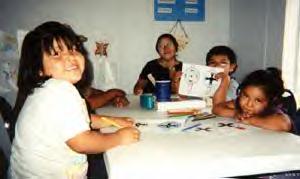|
|
Canku Ota |
|
|
(Many Paths) |
||
|
An Online Newsletter Celebrating Native America |
||
|
September 22, 2001 - Issue 45 |
||
|
|
||
|
Language Immersion Camp Successful At Second Mesa |
||
|
story and photo by Debra Moon The Navajo-Hopi Observer |
 “No English
Allowed” was the slogan posted in several spots around the language immersion camp at Second Mesa in July and August
of this summer. The immersion technique helps to break barriers, especially for those who understand a lot of Hopi,
but are hesitant to speak it. Since the whole point is to start speaking, eventually everyone does, especially
as they see others doing the same thing. This is the advantage of an immersion camp. By the end of the three weeks,
everyone is speaking a lot, and they will never go back to their original feeling of fear about making mistakes. “No English
Allowed” was the slogan posted in several spots around the language immersion camp at Second Mesa in July and August
of this summer. The immersion technique helps to break barriers, especially for those who understand a lot of Hopi,
but are hesitant to speak it. Since the whole point is to start speaking, eventually everyone does, especially
as they see others doing the same thing. This is the advantage of an immersion camp. By the end of the three weeks,
everyone is speaking a lot, and they will never go back to their original feeling of fear about making mistakes.The three-week camp ran from July 23rd to August 9th at the learning center trailer at Toreva. Sixty-one children attended and eight instructors worked to help them speak only Hopi at the camp. The camp was preceded by an intensive training for the instructors that lasted three days. Donna Boyden from the Acoma Pueblo in New Mexico came to do the training with the language camp staff. After it was finished, the teachers continued to work each day to prepare the materials to teach the students. Teachers were dedicated community members who are considered “speakers” of the language. They received small stipends for their participation and agreed to try to help “non-speakers” learn more Hopi to preserve and protect the language and their culture. One class was devoted to older teens and adults who really wanted to learn. Most students were beginners, but some were intermediate, so teachers prepared their lessons according to what their group needed. The groups also enjoyed fun and snacks together. The program did more than just teach Hopi words, it also taught traditions and beliefs. It raised awareness too. Teacher, Vernice Koruh, says, “Now that I’m finishing this program, I am really focusing on speaking more Hopi to the children, not just my own, but all the children in the village. I’ve been doing that these last few days, and I want to continue.” Teachers for the camp were Eula Koyawena, Jeanette Sahneyah, Vernice Koruh, Lamar Honyaktewa, Delores Coochyamptewa, Debbie Puhuyaoma, Terrance Lomayestewa, Darlene Quavehema, and Dorothy Lucas. Dorothy also helped produce the teaching materials on computer and helped Sheila Rosetta with coordinating duties, especially where curriculum was concerned. She was a curriculum assistant, having been involved with the language training and classes. Hopi Pu’tavi Project sponsored the camp. It was funded by the National 4-H Council Innovation Center. Contact, Kristen Spangler from the Center invested a lot of time to help make the camp a success too. Thanks are due to her, and the other staff at the Innovation Center, for investing in the community by supporting the teaching of language and tradition at Hopi. Right now Hopi Pu’tavi is sponsoring fund-raising events to establish monies to help continue the classes through the year and to support another immersion camp for next summer. Rummage sales each month under the tree at the Sekakuku Market at Second Mesa help distribute rummage sent by Swift Trucking from Bethell Lutheran Church in Ohio and raise funds for the language program. |
|
Hopi Pu'tavi Project, Inc |
|
|
||
|
|
||
| Canku Ota is a free Newsletter celebrating Native America, its traditions and accomplishments . We do not provide subscriber or visitor names to anyone. Some articles presented in Canku Ota may contain copyright material. We have received appropriate permissions for republishing any articles. Material appearing here is distributed without profit or monetary gain to those who have expressed an interest. This is in accordance with Title 17 U.S.C. section 107. | ||
|
Canku Ota is a copyright © 2000, 2001 of Vicki Lockard and Paul Barry. |
||
|
|
|
|
|
The "Canku Ota - A Newsletter Celebrating Native America" web site and its design is the |
||
|
Copyright © 1999, 2000, 2001 of Paul C. Barry. |
||
|
All Rights Reserved. |
||
